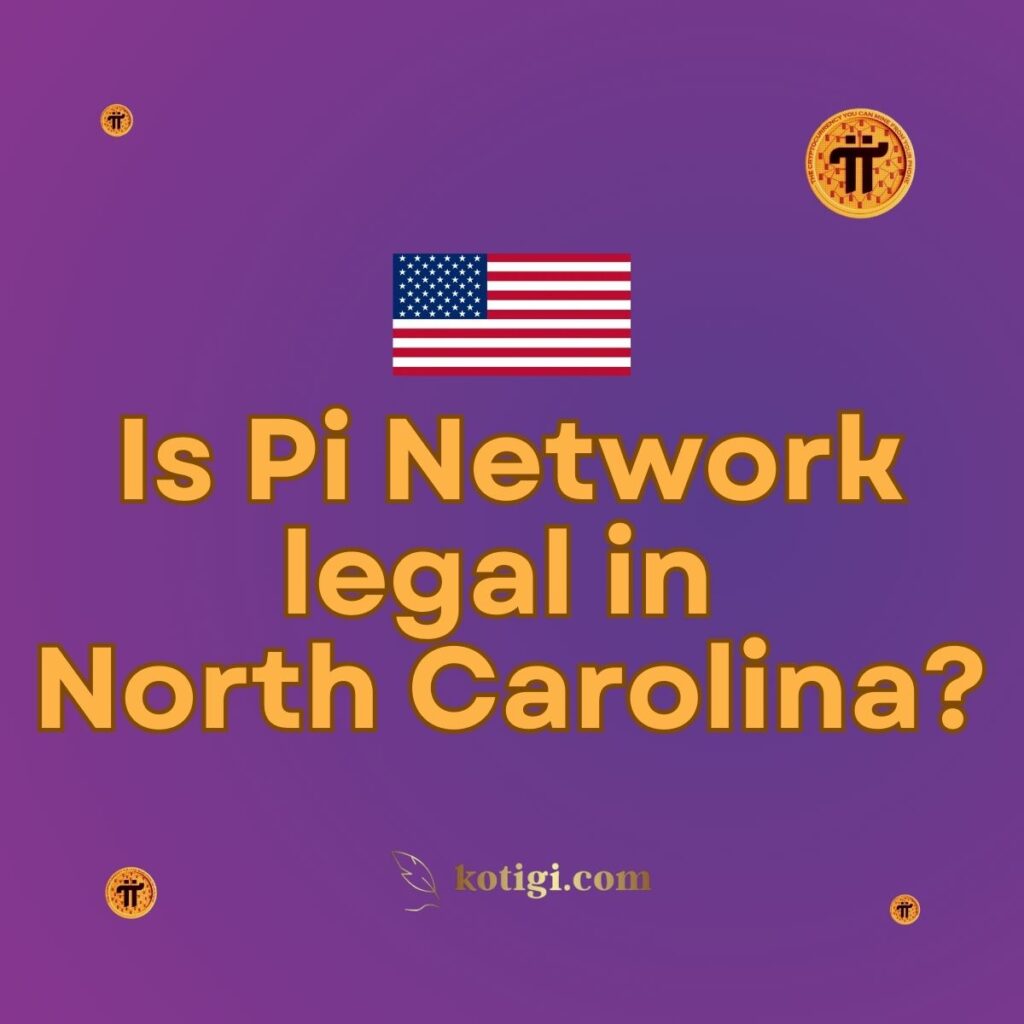
Is Pi Network legal in North Carolina?
Yes, Pi Network operates legally in North Carolina, aligning with both state and federal cryptocurrency regulations. Although North Carolina does not have specific digital currency licensing requirements, Pi Network ensures compliance with broader financial standards, including anti-money laundering (AML) and know-your-customer (KYC) protocols, to provide a secure and transparent platform for users in the state.
Introduction
North Carolina has taken a balanced approach to cryptocurrency regulation, which allows digital currency platforms like Pi Network to operate within the state. As the digital asset market grows, North Carolina continues to focus on ensuring consumer protection without stifling innovation. This article delves into Pi Network’s legal status in North Carolina, how the platform aligns with state regulatory guidelines, and the unique opportunities it presents for North Carolinians interested in cryptocurrency.
1. Cryptocurrency Regulations in North Carolina
Although North Carolina lacks state-specific licensing requirements for digital currencies, platforms must still adhere to federal standards to ensure consumer safety.
1.1 Regulatory Environment for Digital Assets
In North Carolina, cryptocurrency companies are subject to federal financial laws, including those aimed at preventing fraud and ensuring financial transparency. While North Carolina hasn’t adopted a digital currency-specific license, it has regulations for money transmitters that certain crypto businesses may need to follow. This framework allows platforms like Pi Network to operate within clear legal boundaries without imposing heavy restrictions.
1.2 Federal Standards Applicable to Cryptocurrency
Federal standards like the Bank Secrecy Act (BSA) and regulations from the Financial Crimes Enforcement Network (FinCEN) require cryptocurrency companies to implement AML and KYC protocols. These regulations apply in North Carolina as well, ensuring Pi Network operates securely and responsibly.
1.3 Money Transmission and Cryptocurrency
North Carolina’s money transmitter laws focus on companies that handle traditional monetary transactions. While cryptocurrencies like Pi are typically exempt from these laws, any exchange of Pi for traditional currency might fall under money transmitter requirements. This distinction allows North Carolina to foster innovation in cryptocurrency while maintaining a level of oversight.
2. How Pi Network Complies with Regulatory Standards?
Pi Network has established protocols to meet federal compliance standards, ensuring security, transparency, and legal standing in North Carolina.
2.1 KYC and Identity Verification
Pi Network enforces a strict KYC process, requiring users to verify their identities when joining the platform. This protocol helps prevent fraudulent activity and aligns with federal standards that North Carolina supports. KYC also enhances trust among users, providing a safer environment for individuals engaging with the platform.
2.2 Anti-Money Laundering Measures
Pi Network implements AML protocols to monitor transactions and detect suspicious activity. These measures not only comply with federal requirements but also reflect the platform’s commitment to user safety. By preventing illicit activities, Pi Network creates a transparent platform, reinforcing its legitimacy within North Carolina.
2.3 Data Security and Privacy
Pi Network prioritizes data security, encrypting user information and ensuring that sensitive data remains protected. These privacy policies are designed to meet high standards, building trust among North Carolinians and ensuring a safe user experience on the platform.
3. Opportunities for Pi Network Users in North Carolina
Pi Network offers several benefits for North Carolinians, including accessible cryptocurrency mining and educational resources.
3.1 User-Friendly Mining Experience
Pi Network’s mobile mining model allows users to participate in cryptocurrency without requiring specialized equipment. This accessibility makes Pi Network an appealing choice for North Carolinians who may not have prior technical expertise but want to explore digital assets.
3.2 Educational Resources and Financial Literacy
Through in-app educational tools, Pi Network provides resources to help users understand cryptocurrency fundamentals. For North Carolinians new to digital currency, these resources provide a foundation for making informed decisions, contributing to a more financially literate user base.
3.3 Community and Collaboration Opportunities
Pi Network’s community features foster collaboration, allowing North Carolinians to connect with users globally. This network enhances user experience by providing access to a supportive community where users can share knowledge, tips, and updates on the cryptocurrency landscape.
4. Regulatory Challenges and Compliance Efforts
Operating in North Carolina involves navigating certain compliance challenges, including adapting to federal regulations and addressing public concerns.
4.1 Federal Compliance Costs
While Pi Network operates within North Carolina without a specific state license, it must still adhere to federal AML and KYC standards, which incur operational costs. These compliance expenses ensure user safety but also require Pi Network to invest in infrastructure, staff training, and technology.
4.2 Potential Changes in State Regulations
Though North Carolina currently has a relatively open approach to digital currency, regulatory landscapes can change. Pi Network remains vigilant, monitoring for any new state-specific regulations that might require additional adjustments to maintain compliance in North Carolina.
4.3 Addressing User Concerns and Public Perception
Despite the increasing adoption of digital currencies, some North Carolinians may remain skeptical of cryptocurrency platforms. Pi Network’s transparent policies and adherence to compliance standards help address these concerns by building trust and credibility within the community.
5. Comparing Pi Network with Other Cryptocurrency Platforms
While Pi Network offers unique features, a comparison with other platforms highlights its strengths and compliance efforts in North Carolina.
5.1 Accessibility Compared to Major Platforms
Compared to traditional exchanges like Coinbase, Pi Network’s mobile-first mining model allows users to mine directly on their smartphones, providing an accessible entry point. This feature appeals to North Carolinians interested in low-cost engagement with cryptocurrency.
5.2 Security and Privacy Standards
Pi Network’s compliance with federal KYC and AML standards aligns it with established platforms, ensuring a secure user environment. This adherence reinforces Pi Network’s reputation as a legitimate, compliant cryptocurrency platform in North Carolina.
5.3 Distinctive Community-Centric Model
Pi Network’s emphasis on community engagement distinguishes it from many other platforms. North Carolinians can benefit from a collaborative ecosystem, enhancing user satisfaction and contributing to a positive experience on the platform.
6. Pi Network’s Vision for Growth in North Carolina
Pi Network’s commitment to transparency, security, and community support positions it well for continued growth in North Carolina.
6.1 Expanding Educational Outreach
As digital currency adoption grows, Pi Network can expand its educational resources, helping North Carolinians gain a comprehensive understanding of cryptocurrency. By promoting responsible use, Pi Network can foster greater engagement and user confidence.
6.2 Engaging Local Communities
Hosting events or webinars for North Carolinians can help increase awareness and clarify the platform’s benefits and security features. Engaging with local communities allows Pi Network to build relationships and encourage informed participation.
6.3 Potential Partnerships with Local Institutions
Forming collaborations with North Carolina-based universities or tech organizations could further Pi Network’s presence in the state. These partnerships could facilitate educational initiatives and contribute to Pi Network’s long-term growth and acceptance.
Conclusion
Pi Network operates legally in North Carolina by adhering to federal regulations that cover AML, KYC, and data security requirements. With its accessible mining model, focus on user privacy, and commitment to community, Pi Network offers an inclusive entry into cryptocurrency for North Carolinians. Though regulatory landscapes are subject to change, Pi Network’s vigilance and compliance-focused approach position it to adapt effectively. By fostering user trust and emphasizing education, Pi Network is well-positioned to thrive in North Carolina’s evolving digital landscape.
Key Takeaways
- Federal Compliance: Pi Network operates legally in North Carolina, complying with federal regulations in lieu of state-specific digital currency licensing.
- User Accessibility: The mobile mining model provides North Carolinians with an easy entry into cryptocurrency without significant hardware costs.
- Commitment to Security: By following AML, KYC, and data protection standards, Pi Network ensures a secure platform for users.
- Community Engagement: Pi Network’s community-focused features enhance the user experience, creating a supportive environment for learning and collaboration.
- Growth Potential: Educational outreach, community events, and potential partnerships can contribute to Pi Network’s expansion in North Carolina.





